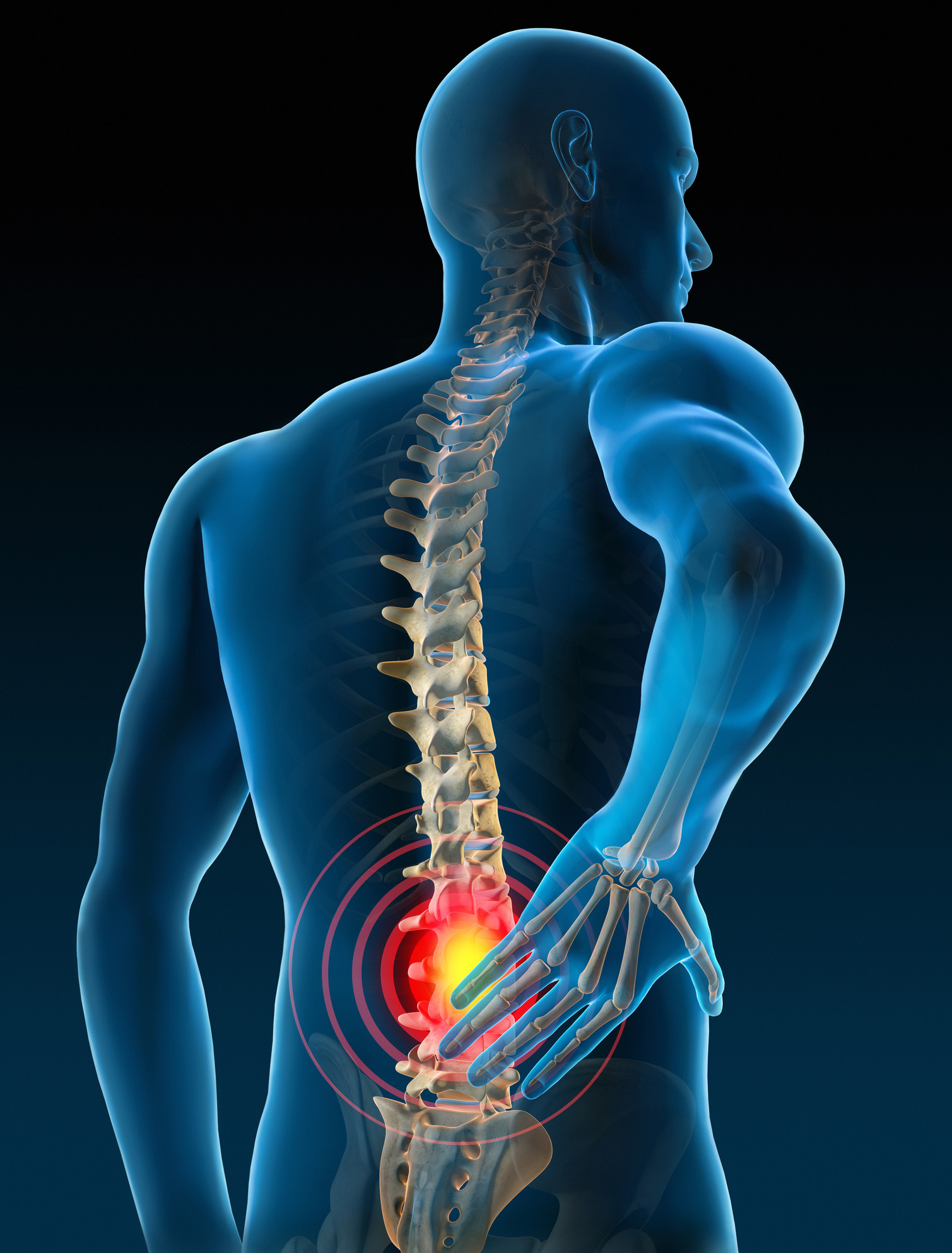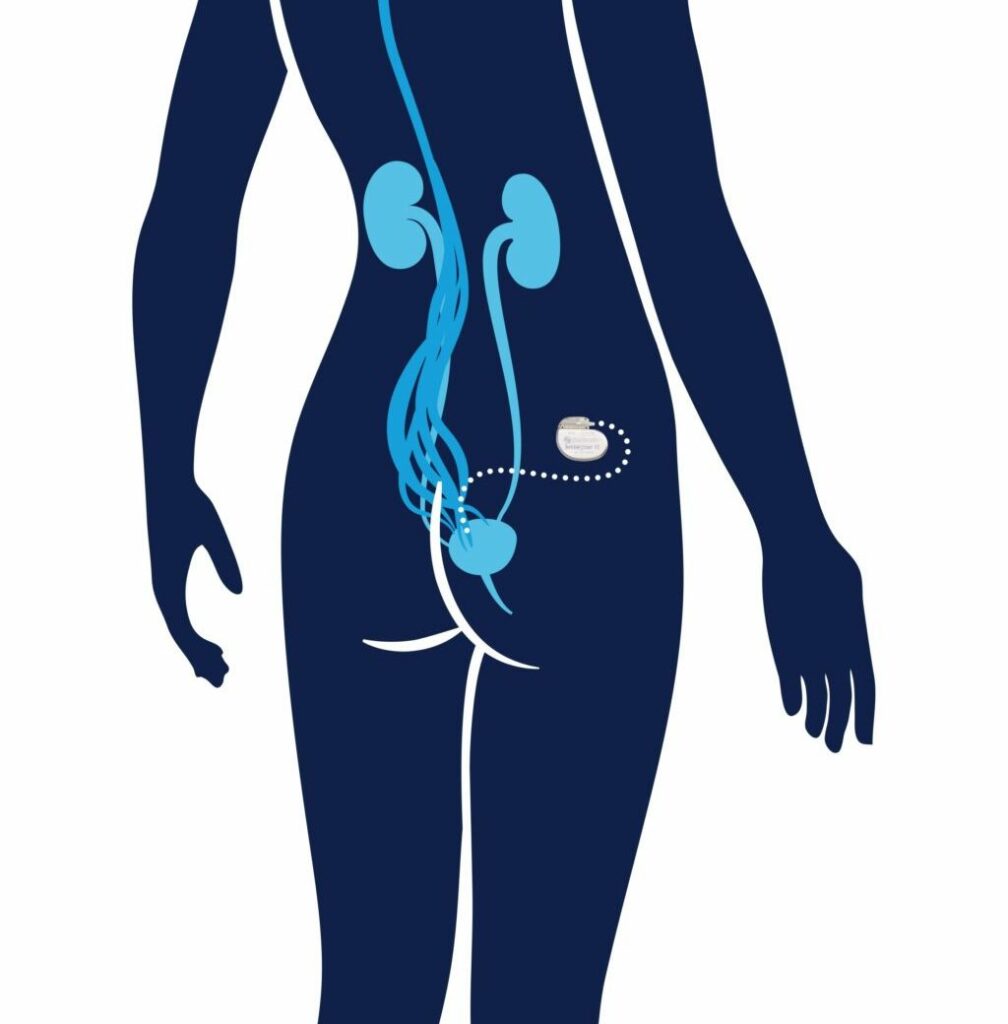Sacral Neuromodulation
What is Sacral Neuromodulation
Sacral neuromodulation (SNM) is a medical treatment that uses an implantable device to stimulate the nerves in the lower bowel, bladder, or pelvic floor. This stimulation can help to alleviate symptoms of certain conditions, including urinary and fecal incontinence, overactive bladder, and chronic pelvic pain.
The SNM device, also known as a sacral nerve stimulator, is implanted under the skin in the buttock area. It sends electrical impulses to the sacral nerves, which are located near the base of the spine and play a key role in controlling the bladder, bowel, and pelvic floor function. The device is programmed to deliver the appropriate stimulation level to help improve the patient’s symptoms.
Sacral neuromodulation is typically used as a second-line treatment for individuals who have not responded to other treatments, such as medication or behavioral therapy. It is also used in cases where surgery is not an option or is not desired by the patient.
The procedure to implant the SNM device is usually done under general anesthesia, and patients may experience some discomfort or bruising at the implant site. However, most people can return to normal activities within a few days of the procedure.
Sacral neuromodulation can be an effective treatment option for certain conditions affecting the bladder, bowel, or pelvic floor function. However, like any medical procedure, it carries some risks and is inappropriate for everyone. If you are considering sacral neuromodulation as a treatment option, it is important to speak with your healthcare provider to determine whether it is right for you.
Specific Conditions Sacral Neuromodulation can Treat

Urinary incontinence
SNM can be used to treat both urge incontinence (the sudden, strong urge to urinate that results in leakage) and stress incontinence (leakage that occurs when pressure is placed on the bladder, such as during exercise or coughing).
Overactive bladder
Overactive bladder (OAB) is characterized by a frequent and urgent need to urinate, often accompanied by involuntary urine leakage. People with OAB may experience these symptoms during the day, at night (nocturia), or both, and they may have difficulty making it to the bathroom in time.
OAB occurs when the muscles in the bladder contract involuntarily, even when the bladder is not full. This can lead to a sudden urge to urinate and, in some cases, urine leakage (incontinence). NMOAB can significantly impact a person’s quality of life, causing anxiety, embarrassment, and social isolation. SNM can help to reduce the frequency and urgency of urination in individuals with overactive bladder.
Chronic pelvic pain
SNM may be used to treat chronic pelvic pain that is related to certain conditions, such as interstitial cystitis or endometriosis. Chronic pelvic pain (CPP) is a persistent pain that occurs in the lower abdomen, pelvis, or genital area and lasts for at least six months. It can be a debilitating condition that significantly impacts a person’s quality of life. CPP can affect both men and women, but it is more common in women.
The causes of CPP can vary and may include gynecological conditions such as endometriosis, pelvic inflammatory disease (PID), or uterine fibroids. In men, CPP may be related to prostate conditions such as prostatitis. Other potential causes of CPP include nerve damage or irritation, bowel or bladder disorders, or musculoskeletal problems.
Symptoms of CPP can vary but may include:
- Chronic or intermittent pain in the lower abdomen or pelvic region
- Pain during sexual intercourse
- Pain or discomfort during urination or bowel movements
- Menstrual pain or irregularities in women
- Pain in the lower back or thighs
Fecal incontinence
SNM can treat fecal incontinence, which is the inability to control bowel movements. Fecal incontinence (FI) is a condition in which an individual cannot control their bowel movements, leading to involuntary leakage of stool. FI can range from occasional accidents to complete loss of bowel control, which can be a source of embarrassment and social isolation for those affected.
Various factors, including damage to the nerves and muscles in the rectum and anal sphincter, certain medical conditions such as inflammatory bowel disease or diabetes, and certain medications such as laxatives or chemotherapy drugs, can cause FI. Lifestyle factors such as poor diet, lack of exercise, or chronic constipation can also contribute to the development of FI.
Chronic constipation
SNM may treat chronic constipation that has not responded to other treatments. Chronic constipation is a common condition in which individual experiences infrequent or difficult bowel movements for an extended period. It is characterized by bloating, abdominal discomfort, and the need to strain during bowel movements.
The causes of chronic constipation can vary and may include certain medical conditions such as irritable bowel syndrome (IBS), hypothyroidism, or diabetes. Lifestyle factors such as a lack of exercise, poor diet, or dehydration can also contribute to chronic constipation.
Interstitial cystitis/bladder pain syndrome
SNM can help to alleviate symptoms of interstitial cystitis. Interstitial cystitis/bladder pain syndrome (IC/BPS) is a chronic condition characterized by bladder pain, urinary urgency and frequency, and in some cases, pelvic pain. It is a complex condition that can be difficult to diagnose and treat.
The exact cause of IC/BPS is not well understood, but it is thought to be related to inflammation and damage to the bladder’s lining. It may also be associated with nerve dysfunction or changes in the immune system. The condition can affect both men and women, but it is more common in women.
Neurogenic bladder
SNM may be used to treat neurogenic bladder, which is a condition that results from nerve damage and can lead to problems with bladder function. Neurogenic bladder is a condition in which the nerves that control bladder function are damaged or not working properly, leading to urinary dysfunction.This can result in various symptoms, including urinary incontinence, urinary retention, and difficulty emptying the bladder. Various factors, including spinal cord injury, multiple sclerosis, or certain neurological conditions, can cause a neurogenic bladder.
Symptoms of neurogenic bladder may vary depending on the underlying cause and the type of neurogenic bladder present. The two main types of the neurogenic bladder are overactive bladder and underactive bladder. An overactive bladder can cause frequent urination, urgency, and urge incontinence. Underactive bladder, on the other hand, can cause difficulty emptying the bladder, incomplete emptying, and urinary retention.
Diagnosis of neurogenic bladder may involve a combination of tests, including a physical exam, urodynamic testing (in which bladder function is measured during filling and emptying), and imaging studies such as an MRI or CT scan. Treatment for neurogenic bladder may involve a combination of lifestyle modifications, medication, and/or surgery.
It is important to note that SNM is typically used as a second-line treatment for these conditions after other treatments, such as medication or behavioral therapy, has been tried and proven ineffective. It is also inappropriate for everyone, and individualized medical evaluation by a qualified healthcare provider is necessary to determine whether SNM is a good option for a given patient.
Recovery From Sacral Neuromodulation

- Rest: After the procedure, you may be advised to rest and limit your physical activity for a few days. You should avoid heavy lifting and strenuous exercise until your doctor advises that it is safe to resume these activities.
- Medication: Your doctor may prescribe pain medication to help manage any discomfort or pain at the implant site. You should take the medication as directed.
- Ice: Applying ice to the implant site for short periods may help reduce swelling and discomfort.
- Follow-Up Appointments: You must attend follow-up appointments with your doctor to monitor your progress and make any necessary adjustments to the device settings.
- Device Care: Your doctor will provide instructions on how to care for the SNM device and its components, including the battery and leads.
- Activity Restrictions: Your doctor may advise you to avoid certain activities that could potentially damage the implant or lead to complications, such as high-impact exercise, swimming, or using certain medical equipment, such as MRI machines.
It is important to note that recovery from SNM is a gradual process, and it may take several weeks or months to achieve the full benefits of the treatment. In some cases, it may take multiple adjustments to the device settings to achieve the desired results. However, for many individuals, SNM can be an effective treatment option, significantly improving their quality of life.
Living With Sacral Neuromodulation
For individuals with certain bladder, bowel, or pelvic floor conditions, SNM can be a life-changing treatment option. The device, implanted under the skin in the buttock area, sends electrical impulses to the sacral nerves to help improve bladder and bowel function and reduce pain.
Living with SNM may involve some adjustments, but many individuals find that the benefits of the treatment far outweigh any challenges. Here are some things to remember when living with SNM:
- Regular Follow-Up Appointments: You will need to attend regular appointments with your healthcare provider to monitor your progress and make any necessary adjustments to the device settings. This may involve testing the device and adjusting the stimulation levels to ensure it provides the desired results.
- Avoiding Certain Activities: Your doctor may advise you to avoid certain activities that could damage the implant or lead to complications, such as high-impact exercise, swimming, or using certain medical equipment, such as MRI machines.
- Battery Replacements: The battery in the SNM device will need to be replaced every few years, depending on how often the device is used.
- Improved Quality of Life: For many individuals, SNM can significantly improve their quality of life by reducing symptoms such as urinary or fecal incontinence, chronic pelvic pain, or constipation.
- Adjustments to Daily Routine: Some individuals may need to adjust their daily routine to accommodate the device, such as carrying a remote control to adjust the stimulation levels or avoiding certain types of clothing that could interfere with the device.
Living with SNM can be a positive experience for many individuals without relief from other treatments. If you are considering SNM as a treatment option, it is important to speak with your healthcare provider to determine whether it is right for you. They can provide more specific information on what to expect when living with SNM and how it may impact your daily life.
Z Urology and Sacral Neuromodulation
Are you suffering from bladder or bowel dysfunction, chronic pelvic pain, or other conditions impacting your quality of life? Z Urology in Boca Raton, Florida, is proud to offer sacral neuromodulation (SNM) as a treatment option to help you regain control and improve your overall well-being.
SNM is a minimally invasive treatment option that involves implanting a small device under the skin in the buttock area to stimulate the sacral nerves and improve bladder and bowel function. This innovative technology effectively reduces symptoms such as urinary or fecal incontinence, chronic pelvic pain, or constipation.
At Z Urology, our team of experienced urologists is dedicated to providing the highest quality care for our patients. We take a patient-centered approach to care, working closely with you to develop a personalized treatment plan that is tailored to your unique needs and goals.
If you are struggling with bladder or bowel dysfunction, chronic pelvic pain, or other conditions that are impacting your quality of life, it’s time to take action. Contact Z Urology today to schedule a consultation and learn more about how sacral neuromodulation can help you regain control and improve your overall well-being. Our team is here to support you every step of the way on your journey to better health.

